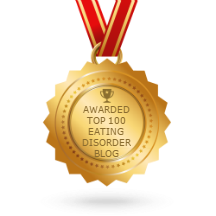- Home
- About
-
Services
- Therapy
-
Eating Disorder Trainings
>
- Clinical Approaches To Treating Body Image Issues
- Clinical Approaches To Treating Bulimia & Binge Eating Disorder
- Finding Freedom From Binge Eating
- Finding Freedom From Anorexia
- Supporting A Loved One With An Eating Disorder
- Eating Disorder Recovery Road Map
- Healing From Body Hate And Practicing Self-Compassion
- Common Questions
- Blog
- Press
- Contact
|
Do you want to come to dinner with us tonight? Her friend asks.
The spiral begins. Her anxiety is mounting. She finds herself lost in endless Google searching of the menu, trying to calculate the nutrition information, searching for pictures of the different options. Her mind is racing, trying to figure out what she can order. It all feels completely overwhelming. It’s no wonder that she’s started declining invitations for meals out, when she is so filled with anxiety and dread. She feels increasingly isolated and alone. Walking by others laughing and eating outside at restaurants, she finds herself looking at them wondering how they can appear so calm and relaxed around food. She struggles with constant thoughts about food, weight, and her body. She finds herself bone-chillingly cold at times. She feels completely trapped. She is not simply making the choice to restrict food, decline invitations to go out to eat, or to exercise despite illness or fatigue. She is struggling with a serious mental illness. As an eating disorder therapist in private practice, I am grateful to be able to help people to recover from eating disorders. The following are three tips for your recovery from anorexia. 1. Start to separate out “the eating disorder self” from the “healthy self.” When I work with clients, often we will start to differentiate between their “eating disorder self” and their “healthy self.” An Example: Eating Disorder Self: “You can’t eat that. It will make you gain weight and it’s so bad for you.” Healthy Self: “No food is good or bad and I deserve to nourish myself with food that I enjoy. What’s truly unhealthy is feeling anxiety and guilt around food.” The first step is starting to recognize the unhelpful thoughts that you’re eating disorder self may be telling you. Then you can practice telling yourself more helpful coping statements, and taking actions that align with your “healthy self” values-no matter what your mind is telling you. 2. Practice acting “as if.” This tip is essentially the “fake it until you make it” approach. Even if your “eating disorder self” is telling you a ton of unhelpful things, it’s crucial to practice taking pro-recovery actions anyways. Often the actions come before the thoughts start to change. Our thoughts alone do not have power to harm us. Therefore, no matter what your eating disorder is telling you to do, it’s important to practice taking actions that help to support your recovery-rather than fuel you’re eating disorder. 3. Set small goals to challenge yourself. It’s so important to challenge yourself and to “step out of your comfort zone” when it comes to recovery from anorexia. Ideally, with the support of a treatment team-it is crucial to start to set small goals to start to challenge any food or exercise rules and rituals. This can help to build your confidence in your ability to recover, and help to break these unhelpful rules and patterns. For example, you might make a list of any “fear foods” and work to gradually challenge yourself to have them (multiple times)-with the support of your therapist, dietitian, or loved one. The Bottom Line Often for people struggling with anorexia, there’s this belief that they are “not sick enough” to seek treatment or to work towards recovery. It’s important to note that typically there is no point where your “eating disorder self” deems you as “sick enough.” If you are struggling, you deserve to seek treatment and support. No one should have to battle an eating disorder alone. Additionally, People struggling with anorexia can come in a variety of shapes and sizes and it’s important to point out that you do not have to appear emaciated (or even thin) to be intensely struggling. Eating disorders are mental illnesses and you can’t tell who is struggling based upon their physical appearance. Ultimately, living with anorexia is a pretty miserable experience. While there may be short-term feelings of a false “sense of control,” or a high, in the long-term, it typically leads to misery, depression, and isolation from others. While anorexia is a terrible mental illness that is not a choice, you can make the decision to seek help and start on the path to recovery. There is a beautiful life waiting for you on the other side of this eating disorder. Freedom and full recovery from anorexia is possible. Yes, for you too. Jennifer Rollin, MSW, LCSW-C: is an eating disorder therapist in private practice in Rockville, Maryland. Jennifer specializes in helping teens and adults struggling with anorexia, binge eating disorder, bulimia, compulsive exercise, and body image issues. Jennifer provides eating disorder therapy in Rockville, MD. Connect with Jennifer through her website: www.jenniferrollin.com
0 Comments
Leave a Reply. |
About MeI'm an eating disorder therapist in private practice in Rockville, MD. Archives
June 2024
|


 RSS Feed
RSS Feed
